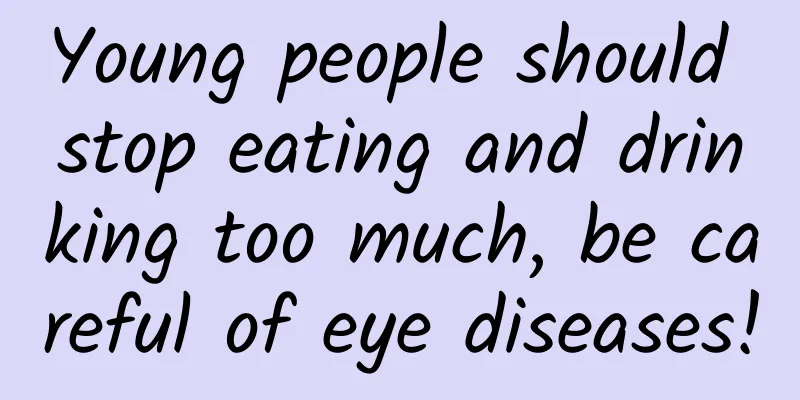Scientists study this every day, is it possible to drink this wine?

|
Author: Mr.Now (Shanghai Pasteur Institute, Chinese Academy of Sciences) The article comes from the Science Academy official account (ID: kexuedayuan) Alcohol, as a very popular beverage worldwide, has always been controversial. Recently, various studies on whether or not to drink alcohol have emerged one after another, and there are many different opinions, which naturally attracted our attention: Can we drink alcohol? Drinking = DNA damage? Let's talk about a previous conclusion first: Image source: Screenshot of a scientific public account "Don't drink a sip", the slogan is really loud and beautiful! So what amazing thing have scientists discovered that makes us give up something as joyful as drinking? They found that there is a gene in the human body that encodes "acetaldehyde dehydrogenase" which is responsible for acetaldehyde metabolism. It is called ALDH2. Acetaldehyde dehydrogenase can kill acetaldehyde, a metabolite of alcohol. If acetaldehyde is not removed in time, it will damage double-stranded DNA, causing double-strand breaks and chromosome rearrangement, resulting in permanent DNA sequence changes that can be inherited to offspring. Schematic diagram of alcohol metabolism process (Source: Internet) If the ALDH2 gene encoding acetaldehyde dehydrogenase mutates, acetaldehyde cannot be metabolized. Once acetaldehyde cannot be metabolized, you can expect DNA damage. And not only you, but also your children! In addition, about 36% of the population in East Asian countries such as China, Japan, and South Korea have mutations in this gene! (So East Asians should give up drinking?) To verify this, scientists created a group of mice that were born without the ALDH2 gene. Not only did they lack the ALDH2 gene, but they also lacked another gene, FANCD2. The FANCD2 gene is responsible for repairing DNA mismatches. In other words, if DNA is damaged by acetaldehyde, this gene may be able to repair the wrong DNA if it is adjusted. But now... Now, both genes are gone. These poor little creatures can neither metabolize the DNA damage caused by acetaldehyde nor repair it artificially. Now everything is ready! Drink! But do you think this is just an ordinary drink? These mice were given diluted alcohol intraperitoneally for ten consecutive days! This is really like injecting alcohol as insulin! After all this torture, the mice finally had a phenotype! Their chromosomes were finally abnormal! Image source: Alcohol and endogenous aldehydes damage chromosomes and mutate stem cells These DNA damages include: deletion, translocation, chromatid breakage and exchange, recombination, multipolarization and aneuploidy, etc. DNA damage can cause abnormalities in hematopoietic stem cells and bone marrow function, and may further cause hematopoietic dysfunction or leukemia! ! ! If this DNA damage is inherited to offspring, it may cause a hereditary blood system disease - Fannik anemia. This is just the beginning of research on drinking... Drinking alcohol causes dementia? Subsequently, an article from The Lancet Public Health showed that a retrospective experiment in France involving more than 30 million people confirmed that heavy drinking is a major risk factor for all types of dementia, and the relationship with early-onset dementia is more obvious. The article surveyed 31.6 million people who were discharged from the hospital between 2008 and 2013, of which more than 1.1 million were diagnosed with dementia and included in the study. 86% had alcohol use disorders (divided into alcohol abuse and alcohol dependence), most of whom were alcohol dependent. The study data showed that about 3% of dementia cases were attributable to alcohol-related brain damage, and nearly 5% of dementia cases had other alcohol use disorders. However, among the 57,000 patients with early-onset dementia (under 65 years old, accounting for 5%), these numbers increased, with 39% of cases attributable to alcohol-related brain damage and 18% of cases having other alcohol use disorders. Alcohol use disorder is simply a mental disorder in which control is impaired and people continue to drink alcohol regardless of adverse consequences. Image source: Contribution of alcohol use disorders to the burden of dementia in France 2008–13: a nationwide retrospective cohort study Panel A shows the relationship between dementia and age, sex, and alcohol-induced brain damage and alcohol use disorder; Panel B shows the sex distribution, age strata, and relationship to alcohol-induced brain damage and alcohol use disorder in early-onset dementia. But, can drinking alcohol actually eliminate toxins from the brain? After reading these "conclusive" studies, some people said: I have made up my mind to quit drinking! but…… Image source: Screenshot of a scientific public account I threw away my bottle opener! Just show me this! This study confirms that the garbage produced by our brain is cleaned up by a system called the glymphatic system, and the efficiency of this system is more active during sleep. In addition, low doses of alcohol can also make it more active! Help detoxify the brain! Image source: Beneficial effects of low alcohol exposure, but adverse effects of high alcohol intake on glymphatic function The blue arrows in the figure represent the glial lymphatic flow. The thicker the arrows are, the better its "vitality" is and the stronger its ability to "clean up garbage". Should I drink wine or not? Such results are simply confusing! Scientists, can we have a peaceful drink? Scientists have actually come up with a solution! They found a protein called SNX10, and the loss of this protein may be beneficial to alcohol metabolism! What does this protein do? Image source: SNX10 mediates alcohol-induced liver injury and steatosis by regulating the activation of chaperone-mediated autophagy The human liver will produce an unstable internal environment due to alcohol metabolism, and to adjust this instability, a chaperone-mediated autophagy (CMA) process is required. The SNX10 protein mentioned earlier will inhibit this process, causing liver damage. However, once the coding gene of SNX10 is knocked out, SNX10 inhibits the activity of cathepsin A, thereby inhibiting the degradation of lysosomal LAMP-2A, promoting the CMA process, and restoring the homeostasis of the liver's internal environment. Look, how happy the children who lack this gene are. Restoring the homeostasis of the internal environment is what we call "stable happiness." (However, these experimental results are still in the laboratory research stage that relies on clear background mice. Whether this gene will be missing in the human body and what consequences will occur after the loss have not yet been scientifically demonstrated.) Scientists at Harvard University recently pointed out that adhering to five low-risk healthy lifestyles can significantly reduce the risk of cardiovascular disease and cancer, and extend life expectancy after the age of 50 by more than 10 years! Women can extend their life expectancy by 14.0 years, while men can extend their life expectancy by 12.2 years. They are: 1. Don’t smoke 2. Maintain a healthy weight (BMI between 18.5-24.9 kg/m2) 3. Exercise regularly (average ≥30 minutes of moderate or vigorous activity per day, including brisk walking) 4. Eat healthy 5. Drink alcohol in moderation (e.g., 5-15 g/day for women and 5-30 g/day for men) So, after paying attention to it for so long, should we drink this wine or not? The answer is "As long as you are happy!!!" However, I still advise everyone that drinking a little can make you happy, but drinking too much can harm your health, and forcing yourself to drink will definitely lead to your death! I wish you all a happy drinking! |
<<: What are the advantages and disadvantages of a balance car? How to play a balance car
Recommend
How to regulate spleen and stomach deficiency and coldness after childbirth
Every mother should pay attention to her body'...
Why do children become frigid after birth?
Many female friends have reported that after havi...
What to eat during menstruation
As women, starting in their teenage years, most o...
How to read Alzheimer's blood test results
Source: Time Master, Ni Xiaojiang...
What are the benefits of taking probiotics for babies? When do we need to supplement probiotics?
When our bodies are infected with gastrointestina...
Causes of absent heart beats
When some pregnant women are examined, doctors wi...
The hair on the chest is very long
I believe many of my friends don’t understand why...
How many eggs can one oocyte differentiate into?
Oocyte: An oogonia that undergoes meiosis during ...
In which Chinese city are the Mogao Grottoes located? What is inside the Mogao Grottoes?
Have you heard of Mogao Grottoes? Most of the pai...
Can breast tumors be cured?
Breast tumors are also called breast cancer. This...
eMarketer: Global mobile messaging app users will exceed 1.4 billion in 2016
199IT original compilation eMarketer predicts tha...
How to determine the exact time of pregnancy
For pregnant women, knowing their pregnancy time ...
Will I get pregnant if I take birth control pills?
Many female friends have tried every possible way...
What are the common gynecological diseases among women?
Women can easily develop gynecological diseases d...
Characteristics of early artificial abortion
When it comes to abortion, many people are famili...









